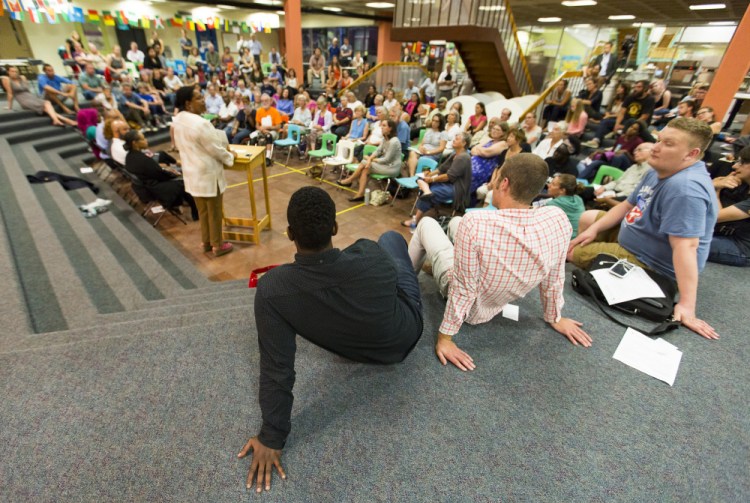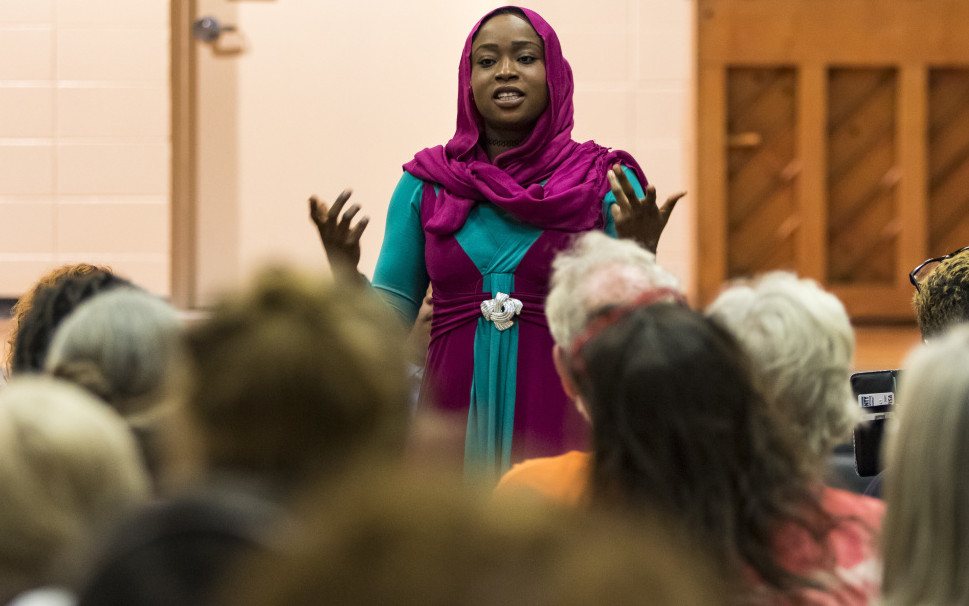Portland Democrats held a forum Thursday evening at the city’s Reiche Elementary School to address what they called systemic racism in Maine’s largest city.
The event was a response to fatal police-involved shootings and mishandled traffic stops and arrests involving black men and women in the country during the past year. The forum came against the backdrop of recent remarks by Gov. Paul LePage about heroin dealers in Maine being mostly black and Hispanic, and Republican presidential candidate Donald Trump’s suggestion in August during a campaign stop in Portland that the presence of Somali immigrants in the state has led to an increase in crime.
In a written statement, the Portland Democratic City Committee said those and other incidents demonstrate that racism is prevalent not only across the nation, but also in Portland.
“While these attacks galvanized solidarity in support of the community, systemic racism is very real in Portland, and our community has much work to do to end racism and reverse decades of injustice,” the committee said.
Thursday’s panel discussion, attended by more than 150 people, was moderated by Danielle Conway, dean at the University of Maine School of Law in Portland. Conway is the first African-American to lead the state’s only law school since it was founded in 1962.
There was barely a mention of LePage during the two-hour forum, although his remarks last week insisting that 90 percent of heroin dealers arrested in Maine are black or Hispanic attracted national attention.
“I think many people in the state are talking about racism, thanks to our governor,” Emily Figdor, chairwoman of the Portland Democratic City Committee, told the audience.
After the forum ended, Figdor explained that Thursday’s event was planned in July after police-involved shootings that resulted in the deaths of black men, including a man in St. Paul, Minnesota, who was shot by an officer after he pulled the man’s car over for having a broken tail light.
“This (event) was much bigger than LePage,” Figdor said.
Panelist Rachel Talbot Ross, president of the Portland branch of the NAACP, said it was difficult for her to attend the forum in the wake of such violence.
“I am sick and tired of talking about this,” Talbot said. “I feel my soul and my emotions have been bruised.”
Several panelists shared stories about how challenging life can be as a black person living in a predominately white state.
The Rev. Kenneth Lewis of the Green Memorial AME Zion Church in Portland recalled the time that he went golfing with two other men, both of whom were also black.
As they passed by a white golfer, the man made a comment that has stuck with Lewis for years.
“He said, ‘Hey, boys,’ even though one of us was older than him. I wanted to punch him,” Lewis said.
Samuel James, a musician and writer based in Portland, said he grew up in Biddeford, the son of multiracial parents. James recounted the time his parents were pushing him in a stroller at a fair. An elderly white couple approached and made a comment that made a diminutive out of a racial slur.
“They meant it as a compliment,” James said.
Sean Alonzo Harris, a successful Portland-based photographer from Cambridge, Massachusetts, said it’s harder for a black man to achieve success.
“For me to get here, I had to work 16 hours a day,” he said. “Racism to me is the exercise of power to keep me out.”
Ekhlas Ahmed, a facilitator and teacher for the Seeds of Peace, said she emigrated to the United States 10 years ago from Darfur, a region in western Sudan.
“A lot of people (of color) are afraid to speak up because they are afraid of what might happen to them,” Ahmed said. “I left the Sudan because of racism and I came here thinking it would be a different life, but it’s not.”
Portland Mayor Ethan Strimling was invited, but was unable to attend because of illness.
Send questions/comments to the editors.





Success. Please wait for the page to reload. If the page does not reload within 5 seconds, please refresh the page.
Enter your email and password to access comments.
Hi, to comment on stories you must . This profile is in addition to your subscription and website login.
Already have a commenting profile? .
Invalid username/password.
Please check your email to confirm and complete your registration.
Only subscribers are eligible to post comments. Please subscribe or login first for digital access. Here’s why.
Use the form below to reset your password. When you've submitted your account email, we will send an email with a reset code.